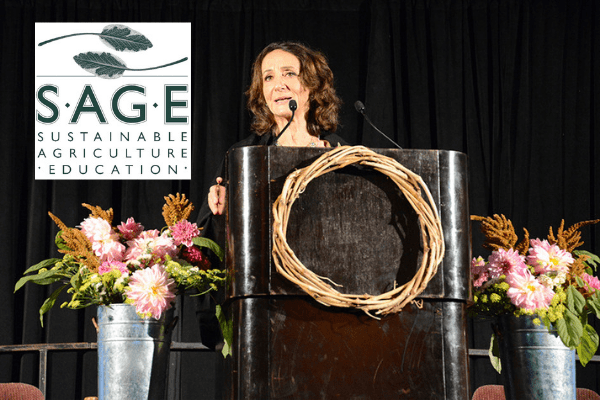Subscribe: Apple Podcasts | Spotify | Amazon Music | iHeartRadio | RSS | More
In Edible-Alpha® podcast #54, Tera talks with Sibella Kraus, founder and director of Sustainable Agriculture Education (SAGE), an entrepreneurial nonprofit with a mission to revitalize agricultural places near cities, and foster vital food systems that connect urban and rural communities through big vision ideas that they implement on the ground with a variety of collaborators. Their consulting services include existing conditions analysis, feasibility studies, business plans, stakeholder engagement and facilitation of multi-party collaborations.
One of the ways that SAGE contributes to the food system is by helping elevate the data around the impact of food and agriculture in a way that helps people understand the connections between this sector and the rest of society and the economy. Sibella has found that other organizations that focus on big picture solutions to pressing problems facing the food system tend to focus on either food waste or agricultural production, but less often on the business of food in between production and end consumer.
And, Sibella has also found that city, regional and state plans for economic development, land use, housing, transportation, equity, jobs/workforce, public health, and water/energy supply don’t always take food and agriculture into consideration. For example, it is hard to maintain a culture and tradition of agriculture or incubate new food businesses in many places in California where affordable housing is not available for food and agricultural workers, given that food and ag sector wages are 64% lower than the Bay Area average annual wage for all other industries.
Sibella and Tera also talked about how the industrial agriculture system that has left many rural communities with less economic opportunities. And, it will take a lot of support to help farmers and rural residents transition to more diverse and resilient systems. Given that in California water is 5 times oversubscribed given the projected needs to maintain the current system and California’s dependence on its rivers behaving a certain way, Sibella is excited about helping the regions she works think about scaling back agricultural production, using water resources as tools for place making and ecosystem services to help deal with weather-related variability.
Much of SAGE’s work involves looking at multiple nested layers of policies at the regional level. For example, the Bay Area Food Futures Roadmap, funded by the Kaiser Permanente Northern California Community Benefits Program, details a framework that could be adopted by regional planning agencies and describes some regional ideas that support regional priorities while recognizing and planning for the food and ag sector. Sibella is excited for SAGE to start exploring further how local and regional planning groups can consider food system resilience as part of their emergency management frameworks.

